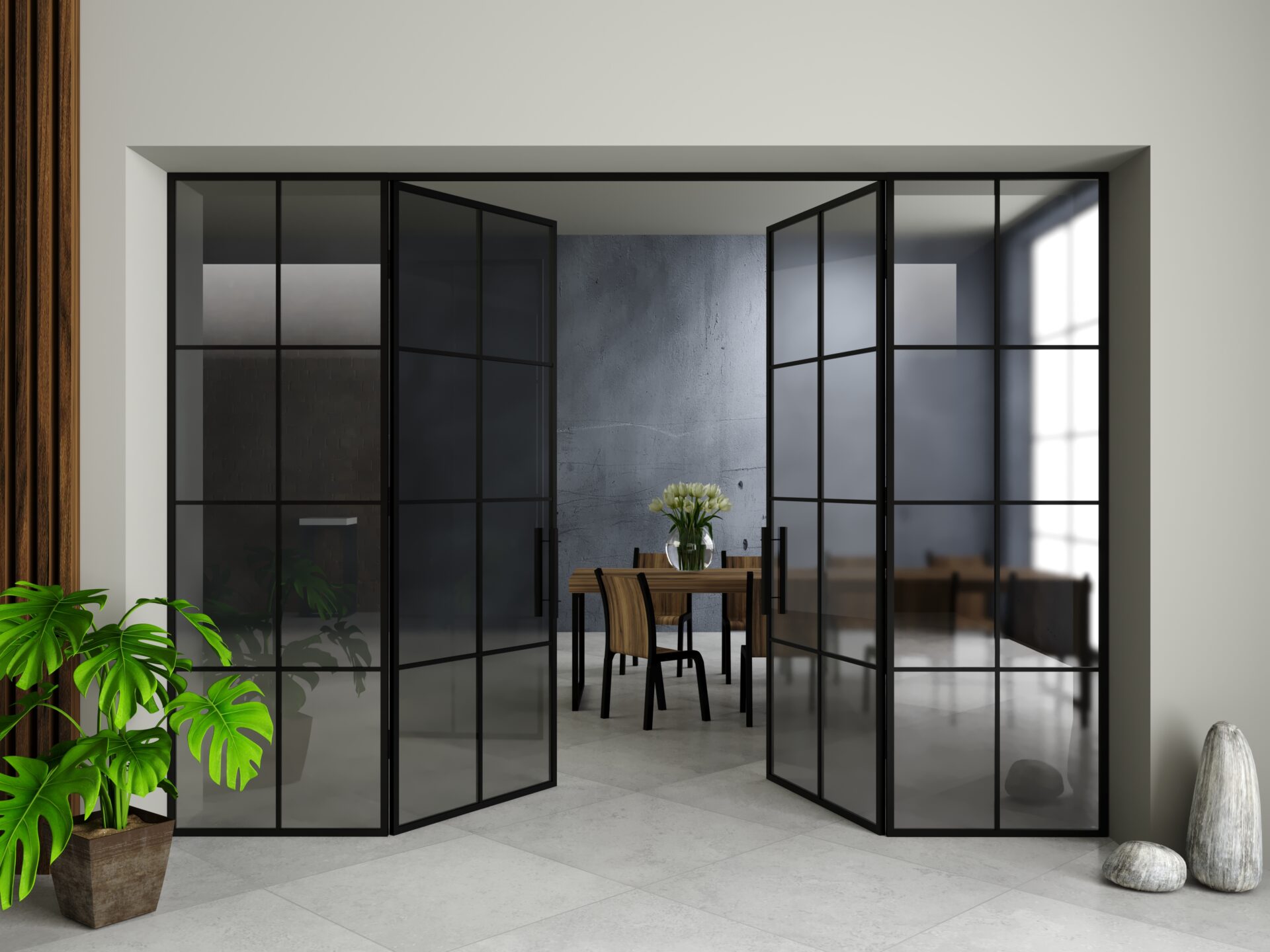
Whether you’re opening up a compact hallway, adding definition to an open-plan space, or refining a modern office layout, glass partition walls offer a clean, purposeful way to divide space without overwhelming it. Their growing popularity in UK homes and commercial interiors comes from their ability to balance style with subtle functionality.
This guide is designed to help you select the most suitable glass wall for your needs based on how you want the space to function, your design goals, and your budget. We’ll walk you through the different types, considerations before buying, cost expectations, and installation insights to ensure your decision is informed and well-aligned with your space.
What are Glass Partition Walls?
Glass partition walls are non-load-bearing interior dividers made from toughened or laminated glass. Unlike permanent walls, they allow light to pass through and provide definition without enclosing a space completely. Used in both residential and commercial settings, they range from minimalist frameless panels to bold framed designs that can become a focal point in the room.
Most systems are available in clear, frosted, tinted, or textured finishes, and the frames are coloured or styled to suit different aesthetics, from contemporary black steel to soft brushed aluminium.
Benefits of Using Glass Walls
1. More natural light: Glass walls extend the reach of natural daylight, especially in spaces with limited windows or interior rooms, improving brightness and energy efficiency.
2. Modern visual appeal: They offer a sleek and contemporary aesthetic that works well with a wide range of interior styles, from industrial to minimalist to transitional.
3. Defined yet fluid space: Perfect for spaces that need visual separation like home offices, reading nooks, or boardrooms without losing a sense of openness or cohesion.
4. Acoustic support: With the right configuration, such as laminated or double glass, glass walls can offer a surprising level of sound reduction for shared environments.
Types of Glass Partition Walls
1. Full glass walls
These floor-to-ceiling partitions are ideal for spaces that need a distinct boundary without visual obstruction, such as enclosed meeting rooms, home offices, or living/dining separations in open-plan homes.
Considerations: Best paired with acoustic upgrades or visual treatments (like frosted film) when privacy or sound control is important.
2. Glass half wall partitions
Half-height glass walls typically run up to waist or chest height and are often used in entryways, reception areas, or to divide dining and kitchen zones.
Advantages: They provide subtle zoning while preserving airiness and views, making them well-suited for homes or hospitality spaces.
3. Black-framed glass partition walls
Black framed glass partitions with aluminium or steel offer a strong architectural edge that’s especially popular in modern interiors.
Design Integration Tip: Complement with matching hardware (door handles, fixtures) for a cohesive look across your space.
Key Factors to Consider Before Buying
1. Purpose & functionality
Start by identifying how the space will be used. Are you aiming for light separation, improved acoustics, or a bold design statement? Function informs everything, from glazing type to layout.
2. Glass thickness & safety
Toughened glass is a must for safety, particularly in high-traffic or commercial areas. For homes, 8–10mm is typical; for offices or public areas, 10–12mm or laminated safety glass is recommended.
3. Acoustic performance
For spaces like meeting rooms or bedrooms near living areas, opt for acoustic glazing. Laminated and double-glazed options help reduce sound transmission while still allowing visibility.
4. Design & customisation
You can personalise your glass wall through frame colour, finish (clear, frosted, tinted), and panel design. For example, black-framed grids or curved edges can dramatically change the look and feel of the partition.
Cost Considerations for Glass Walls in the UK
| Glass type | Average cost (£/m²) |
|---|---|
| Full glass wall | £250 – £600 |
| Glass half wall partition | £200 – £450 |
| Black-framed glass wall | £300 – £650 |
Final costs depend on glass thickness, glazing type, framing material, and complexity of installation. Custom finishes, privacy films, and hardware will also influence your total investment.
Installation Process Overview
Step 1: Site assessment & measurements
We review your space, take precise measurements, and confirm your goals for layout, sound control, and design.
Step 2: Design finalisation
Based on your chosen glass wall, we prepare layouts, suggest finishes, and configure any needed acoustic or privacy enhancements.
Step 3: Fabrication & framing
All glass panels and framing components are cut, toughened, and finished to specification, ready for on-site installation.
Step 4: Professional installation
Our trained specialists handle the full installation process, ensuring each panel is aligned, sealed, and secured to meet safety and acoustic standards.
Step 5: Final review
We conduct a detailed quality check, clean down the area, and walk you through maintenance steps for long-term care.
Why professional installation matters
Glass partition systems require expert handling. DIY installation is strongly discouraged due to the precision, safety, and compliance standards involved. Professional fitting guarantees proper alignment, structural stability, and a seamless finish that will perform long-term.
Common Mistakes to Avoid When Choosing Glass Partitions
1. Neglecting acoustic and privacy needs, especially in multifunctional or shared spaces.
2. Choosing the wrong glass thickness, which can impact both safety and stability.
3. Skipping professional consultation, leading to incorrect sizing or unsuitable materials.
4. Overlooking long-term maintenance, especially if using patterned or tinted finishes that show smudges or scratches more easily.
Maintenance & Care Tips
1. Regular cleaning: Use a non-abrasive cleaner and soft cloth to avoid scratching.
2. Seal check-ups: Inspect joints and seals every few months, especially for framed systems.
3. Prevent impact: Avoid hanging or leaning heavy objects against glass panels.
4. Hardware care: Clean and lubricate door hinges or sliding tracks periodically to ensure smooth function.
FAQs
Not entirely, but acoustic glass, laminated options, and seals can significantly improve sound insulation.
.
DIY installation is possible but professional installation is advised for safety and performance.
No special treatments are needed, just standard glass cleaning and occasional checks on seals and fittings.
Costs range from £200 to £650 per square metre depending on type, size, framing, and finish. Contact us for a quick quote.
Yes, due to the added structure, custom powder-coating, and detailing involved.














